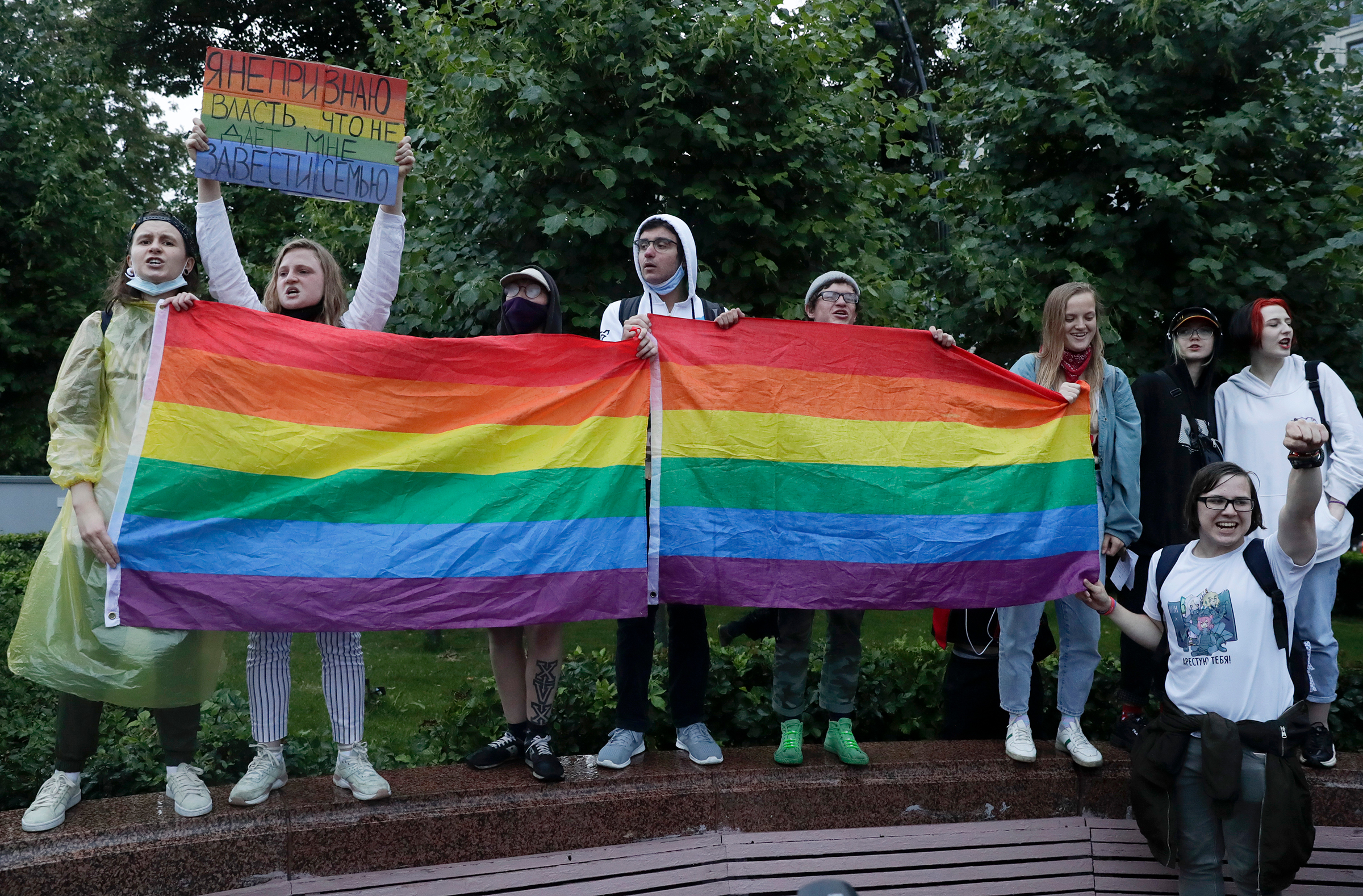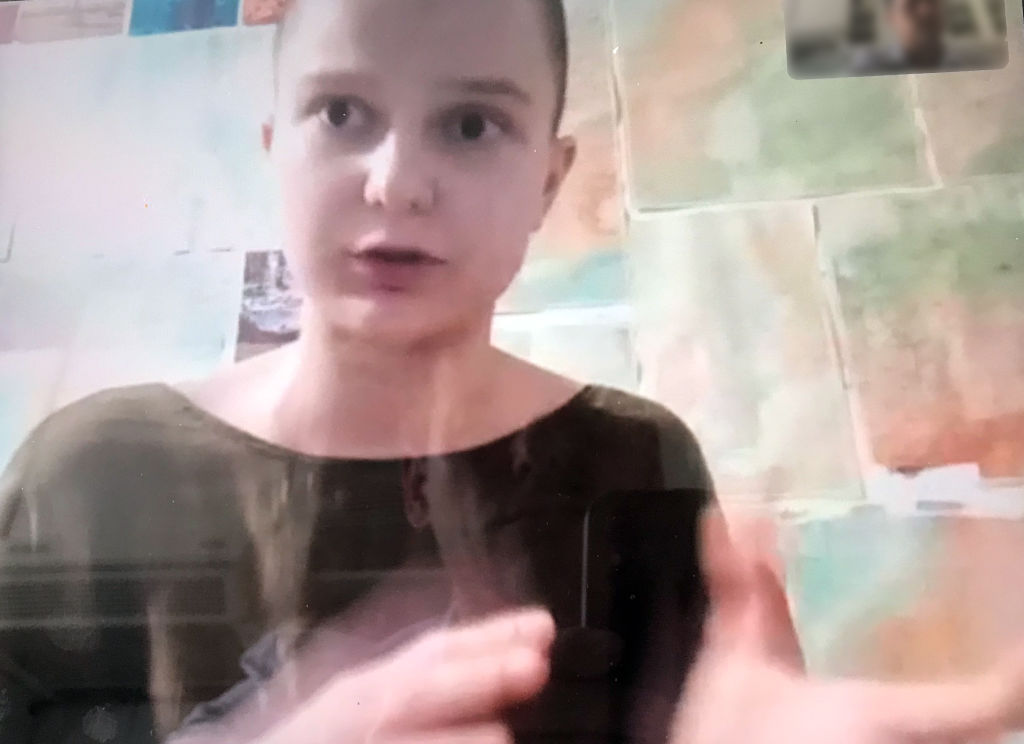
There aren’t many people like Yulia Tsvetkova in Komsomolsk-on-Amur. The Russian city is 5,000 miles and seven time zones east of the capital, Moscow, and for half the year, it is under snow or ice. It’s known more for shipbuilding and aircraft manufacturing than LGBTQ rights and feminist activism — but that hasn’t stopped Tsvetkova forging a reputation in both. “There are practically no activists here, most of them try to leave,” she says, over a phone call. “But there’s still a lot I can do.”
In the past three years, the 27-year-old has headed a youth theatre, where she created plays that explored gender stereotypes, run online groups on feminism and sex education, and published drawings that she says promote LGBTQ and women’s rights on social media. Her activism has made her a target for the authorities. In July, about a week after the Kremlin pushed through constitutional amendments that include defining marriage as a union between a man and woman, Tsvetkova was fined for a second time under the country’s notorious “gay propaganda” law and forced to pay 75,000 Rubles ($1000) over her colorful illustrations of same-sex couples and their young children.
Tsvetkova is now facing charges of “spreading pornography” for a Vagina Monologues page she published on social media last November, which features illustrations of vaginas, aimed at breaking the stigma around women’s bodies. “I laughed, my lawyer laughed, my friends laughed. Anyone can see that this isn’t pornography,” she says. Yet she spent four months under house arrest and prosecutors are relentlessly trying to build a case against her. If she is found guilty, as 99% of those prosecuted in Russia’s criminal courts are, she could be sent to jail for up to six years. Tsvetkova has become a symbol of the resistance against Russia’s enforcement of “traditional values” and despite the Kremlin’s attempt to stigmatize her activism, she has received unprecedented support from celebrities, artists and journalists across Russia and beyond.
The defiance of Tsvetkova and many other LGBTQ activists in Russia may finally be paying off. Two weeks after the constitution was changed, the government proposed a bill to ban same-sex marriage and end the legal recognition of transgender people. Many activists had expected the landmark bill, co-authored by conservative lawmaker Elena Mizulina, to pass in the fall. But on Nov. 16 parliament revoked the bill for revision and it could now be scrapped altogether.
Svetlana Zakharova, a spokesperson at the Russian LGBT Network in St. Peterburg says she can’t say for sure why the law was repealed, but emphasizes that the LGBTQ community and its allies in Russia managed to unite to resist the legislation “more than ever before”. “Our activities, together, helped to dismiss the bill,” she says. Mizulina lost support because of the “tremendous level of public outrage about the bill’s homophobia and transphobia,” Jonny Dzhibladze, a coordinator at Vykhod (“Coming Out”), a St.Petersburg based LGBT rights group, says. “It looks like we can breathe freely for some time,” he says.
But a battle won does not mean the war is over. The climate for LGBTQ people in Russia is still extremely hostile. According to a 2019 report by the Russian LGBT Network, 12% of LGBT people surveyed reported being subject to physical attacks, and 56%, psychological abuse. LGBTQ activists have been arrested, attacked and killed. “If you live your life quietly and you do not make demands from the government, you do not express yourself publicly as an LGBT person, the government is not going to go after you,” says Tanya Lokshina, associate director for Human Rights Watch’s Europe and Central Asia division. The repeal of the bill is unlikely to change that situation. “It’s not as if everything was fine before the bill, and if it passed, everything would be bad,” says Tsvetkova. But it does seem like “we’re in a moment of transition between accepting what’s around us and challenging it,” she says.

Russia’s culture of intolerance
Over the past 20 years, Russian President Vladimir Putin has closely aligned himself with the socially conservative Orthodox Church and has enacted legislation in purported defense of “traditional values” that activists say has promoted a culture of hostility toward the LGBTQ community. Russia is already one of the least LGBTQ friendly places in Europe, ranking higher than only Armenia, Azerbaijan and Turkey in the 2019 Rainbow Index, by Brussels-based advocacy group Ilga-Europe. In 2012, Moscow city authorities banned pride events for 100 years.
A year later Putin passed the so-called “gay propaganda” law, which bans information deemed to promote homosexuality to minors. The punishments were not severe, but it made it more dangerous for LGBTQ activists to claim their rights and stifled access to support services for LGBTQ youth. Alexander Kondakov, a researcher at the Centre for Independent Social Research in St. Petersburg says “It cannot be denied that the discriminatory law and the hateful rhetoric around LGBT rights at the time influenced an increase in violence towards LGBT people”.
Then came this year’s bill. Activists say the legislation represented an escalation, taking aim at the rights of transgender people in particular. It was a “tremendous blow” for the trans community in Russia, says Lokshina. Activists say that ending legal recognition – banning transgender people from changing the sex on their birth certificate – as the bill proposed, would further marginalize an already vulnerable group and open the way for more discrimination.
Alexei Lis, a 36 year-old activist and transgender man from St. Petersburg says that “If the police stop me and ask for my I.D. and see a woman’s photo, I could be harassed and beaten.” Gaining legal recognition is “an important step for transgender people in intergrating in society”, in terms being able to apply for jobs and access medical services without fear of discrimination, says Reinera Veles, an 23 year-old activist and transgender woman from Moscow.
For many LGBTQ people and their allies, the bill was a step too far. Russian LGBTQ activists fought back through campaigns including a social media movement (#ProtectRussianTransLives) and a petition that has been signed by almost 23,000 people. Dozens of doctors specializing in gender transition also condemned the move. In an appeal to lawmakers, medical professionals wrote that the bill will “destroy” the process of full gender transition by ending the legal recognition of transgender people. They said that the practice, which has been in place for decades in Russia, is “extremely important” for the “socialization” of transgender people. Banning it would “aggravate” gender dysphoria, they said.
High profile figures also joined the protest, including playwright Valery Pecheikin, opposition politician Dmitry Gudkov, and lawmaker and TV presenter Oksana Pushkina. Defying her colleagues in Putin’s United Russia party, Pushkina called it “an absolutely insane law” in an interview with TV Dozhd (“Rain”), one of the country’s few remaining independent outlets. Referring to Article 19 of Russia’s Constitution, which guarantees equal rights and freedoms to all citizens, she emphasized that “sexual orientation cannot be the basis for restricting civil rights.” Afterwards, several LGBTQ activists wrote open letters to Pushkina explaining how the bills would affect them.
The Russian government has entrapped itself, says Lokshina. “The more the government cracks down, the more vigorous LGBT activism in Russia becomes,” she explains. “One of the greatest developments” that she says she’s seen in her 20 years of human rights work in Russia is the “the mainstreaming” of the LGBTQ rights movement. “Seven or eight years ago LGBT activists were seen as separate from the human rights community. The mainstreaming happened because of the crackdown,” she says.
Justice for Yulia
The widespread criticism over Tsvetkova’s persecution is a case in point. Several high profile figures have publicly defended her over the “pornography” investigation, including TV host and former presidential candidate Ksenia Sobchak, actress Renata Litvinova, and veteran broadcaster Vladimir Pozner. They urged the authorities to protect the activist, who says she has received death threats from an anonymous homophobic network called Saw that publishes the names and contacts of LGBTQ people, and calls for violence against them. LGBTQ activist Elena Grigoryeva was murdered in July 2019 after her details appeared on Saw’s website.
Opposition grew. In June, over 500 Russians across the country staged single person pickets in solidarity with Tsvetkova. Police responded aggressively, detaining 40 demonstrators in Moscow and St. Petersburg. The same month, over 50 media outlets organized a “Media Strike for Yulia”, demanding that the “pornography” investigation be dropped. Writers, journalists, actors, influencers, and bloggers published articles, including in Vogue, under the hashtag #forYulia and #FreeJuliaTsvetkova, and some 248,000 people signed an online petition calling on authorities to drop the case against her.
Until recently, very few public figures in Russia were voicing their support for LGBTQ issues, says Zakharova, at the Russian LGBT network. “It shows that society is changing. It’s not as homophobic as our officials and religious leaders think,” she says. While the Russian public is still deeply divided on LGBTQ rights, support for the community appears to be growing. A 2019 poll by the Levada Center, an independent polling agency in Moscow, found that 47% of Russians support equal rights for the LGBTQ community, the highest level in 14 years (43% were not in support). The trend is especially pronounced in 16-18-year-olds, 81% of whom reported a “friendly or calm attitude” toward LGBTQ people and 33% reported having LGBTQ acquaintances, compared to 42% and 8% respectively among the general public. “There’s a lot of hope in young people,” says Zakharova.
While there is little evidence that Putin’s ruling party is becoming less hostile to LGBTQ people, there seems to have been a shift in attitudes among Russia’s democratic opposition figures. In 2009, Russia’s most prominent opposition figure Alexei Navalny suggested that gay people could “frolic” in a cordoned stadium rather than in public in a Pride Parade. Yet during his bid for Moscow mayor in 2013 and an aborted run for the presidency in 2017, he proposed to allow regional referenda on same-sex marriages. More recently, in June, he accused the government of going “completely crazy” after pro-Kremlin media group Patriot released a homophobic political advert. Sobchak, the TV host, in 2011 doubted the need for same-sex marriages. “I just don’t understand why this phenomenon should be called marriage,” she said. But as a presidential candidate in 2018, she included same-sex civil unions and the lifting of the “gay propaganda” law in her political program.
The repeal of the bill was an important win for Russia’s LGBTQ community, but it’s just one victory. “It’s not the end point,” Tsvetkova says. “Homophobia is a daily reality in Russia”. Battling that requires the daily work of LGBTQ groups across the country, the willingness of the the public to speak out about inequality and efforts of human rights lawyers as they defend LGBTQ rights activists, like Tsvetkova, who currently awaits the start of her trial. But many activists feel that the change that they have long been fighting for is finally in the air.
More Must-Reads from TIME
- Breaking Down the 2024 Election Calendar
- How Nayib Bukele’s ‘Iron Fist’ Has Transformed El Salvador
- What if Ultra-Processed Foods Aren’t as Bad as You Think?
- How Ukraine Beat Russia in the Battle of the Black Sea
- Long COVID Looks Different in Kids
- How Project 2025 Would Jeopardize Americans’ Health
- What a $129 Frying Pan Says About America’s Eating Habits
- The 32 Most Anticipated Books of Fall 2024
Contact us at letters@time.com